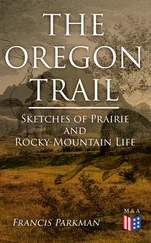Francis Parkman - Tte Oegon Trail
Здесь есть возможность читать онлайн «Francis Parkman - Tte Oegon Trail» весь текст электронной книги совершенно бесплатно (целиком полную версию без сокращений). В некоторых случаях можно слушать аудио, скачать через торрент в формате fb2 и присутствует краткое содержание. Жанр: Приключения про индейцев, Историческая проза, Прочая документальная литература, на английском языке. Описание произведения, (предисловие) а так же отзывы посетителей доступны на портале библиотеки ЛибКат.
- Название:Tte Oegon Trail
- Автор:
- Жанр:
- Год:неизвестен
- ISBN:нет данных
- Рейтинг книги:5 / 5. Голосов: 1
-
Избранное:Добавить в избранное
- Отзывы:
-
Ваша оценка:
- 100
- 1
- 2
- 3
- 4
- 5
Tte Oegon Trail: краткое содержание, описание и аннотация
Предлагаем к чтению аннотацию, описание, краткое содержание или предисловие (зависит от того, что написал сам автор книги «Tte Oegon Trail»). Если вы не нашли необходимую информацию о книге — напишите в комментариях, мы постараемся отыскать её.
Tte Oegon Trail — читать онлайн бесплатно полную книгу (весь текст) целиком
Ниже представлен текст книги, разбитый по страницам. Система сохранения места последней прочитанной страницы, позволяет с удобством читать онлайн бесплатно книгу «Tte Oegon Trail», без необходимости каждый раз заново искать на чём Вы остановились. Поставьте закладку, и сможете в любой момент перейти на страницу, на которой закончили чтение.
Интервал:
Закладка:
Here and there walked an Indian, engaged in watching the horses. No sooner did we see them than Tete Rouge begged Delorier to stop the cart and hand him his little military jacket, which was stowed away there. In this he instantly invested himself, having for once laid the old buffalo coat aside, assumed a most martial posture in the saddle, set his cap over his left eye with an air of defiance, and earnestly entreated that somebody would lend him a gun or a pistol only for half an hour. Being called upon to explain these remarkable proceedings, Tete Rouge observed that he knew from experience what effect the presence of a military man in his uniform always had upon the mind of an Indian, and he thought the Arapahoes ought to know that there was a soldier in the party.
Meeting Arapahoes here on the Arkansas was a very different thing from meeting the same Indians among their native mountains. There was another circumstance in our favor. General Kearny had seen them a few weeks before, as he came up the river with his army, and renewing his threats of the previous year, he told them that if they ever again touched the hair of a white man's head he would exterminate their nation. This placed them for the time in an admirable frame of mind, and the effect of his menaces had not yet disappeared. I was anxious to see the village and its inhabitants. We thought it also our best policy to visit them openly, as if unsuspicious of any hostile design; and Shaw and I, with Henry Chatillon, prepared to cross the river. The rest of the party meanwhile moved forward as fast as they could, in order to get as far as possible from our suspicious neighbors before night came on.
The Arkansas at this point, and for several hundred miles below, is nothing but a broad sand-bed, over which a few scanty threads of water are swiftly gliding, now and then expanding into wide shallows. At several places, during the autumn, the water sinks into the sand and disappears altogether. At this season, were it not for the numerous quicksands, the river might be forded almost anywhere without difficulty, though its channel is often a quarter of a mile wide. Our horses jumped down the bank, and wading through the water, or galloping freely over the hard sand-beds, soon reached the other side. Here, as we were pushing through the tall grass, we saw several Indians not far off; one of them waited until we came up, and stood for some moments in perfect silence before us, looking at us askance with his little snakelike eyes. Henry explained by signs what we wanted, and the Indian, gathering his buffalo robe about his shoulders, led the way toward the village without speaking a word.
The language of the Arapahoes is so difficult, and its pronunciations so harsh and guttural, that no white man, it is said, has ever been able to master it. Even Maxwell the trader, who has been most among them, is compelled to resort to the curious sign language common to most of the prairie tribes. With this Henry Chatillon was perfectly acquainted.
Approaching the village, we found the ground all around it strewn with great piles of waste buffalo meat in incredible quantities. The lodges were pitched in a very wide circle. They resembled those of the Dakota in everything but cleanliness and neatness. Passing between two of them, we entered the great circular area of the camp, and instantly hundreds of Indians, men, women and children, came flocking out of their habitations to look at us; at the same time, the dogs all around the village set up a fearful baying. Our Indian guide walked toward the lodge of the chief. Here we dismounted; and loosening the trail-ropes from our horses' necks, held them securely, and sat down before the entrance, with our rifles laid across our laps. The chief came out and shook us by the hand. He was a mean- looking fellow, very tall, thin-visaged, and sinewy, like the rest of the nation, and with scarcely a vestige of clothing. We had not been seated half a minute before a multitude of Indians came crowding around us from every part of the village, and we were shut in by a dense wall of savage faces. Some of the Indians crouched around us on the ground; others again sat behind them; others, stooping, looked over their heads; while many more stood crowded behind, stretching themselves upward, and peering over each other's shoulders, to get a view of us. I looked in vain among this multitude of faces to discover one manly or generous expression; all were wolfish, sinister, and malignant, and their complexions, as well as their features, unlike those of the Dakota, were exceedingly bad. The chief, who sat close to the entrance, called to a squaw within the lodge, who soon came out and placed a wooden bowl of meat before us. To our surprise, however, no pipe was offered. Having tasted of the meat as a matter of form, I began to open a bundle of presents- tobacco, knives, vermilion, and other articles which I had brought with me. At this there was a grin on every countenance in the rapacious crowd; their eyes began to glitter, and long thin arms were eagerly stretched toward us on all sides to receive the gifts. The Arapahoes set great value upon their shields, which they transmit carefully from father to son. I wished to get one of them; and displaying a large piece of scarlet cloth, together with some tobacco and a knife, I offered them to any one who would bring me what I wanted. After some delay a tolerable shield was produced. They were very anxious to know what we meant to do with it, and Henry told them that we were going to fight their enemies, the Pawnees. This instantly produced a visible impression in our favor, which was increased by the distribution of the presents. Among these was a large paper of awls, a gift appropriate to the women; and as we were anxious to see the beauties of the Arapahoe village Henry requested that they might be called to receive them. A warrior gave a shout as if he were calling a pack of dogs together. The squaws, young and old, hags of eighty and girls of sixteen, came running with screams and laughter out of the lodges; and as the men gave way for them they gathered round us and stretched out their arms, grinning with delight, their native ugliness considerably enhanced by the excitement of the moment.
Mounting our horses, which during the whole interview we had held close to us, we prepared to leave the Arapahoes. The crowd fell back on each side and stood looking on. When we were half across the camp an idea occurred to us. The Pawnees were probably in the neighborhood of the Caches; we might tell the Arapahoes of this and instigate them to send down a war party and cut them off, while we ourselves could remain behind for a while and hunt the buffalo. At first thought this plan of setting our enemies to destroy one another seemed to us a masterpiece of policy; but we immediately recollected that should we meet the Arapahoe warriors on the river below they might prove quite as dangerous as the Pawnees themselves. So rejecting our plan as soon as it presented itself, we passed out of the village on the farther side. We urged our horses rapidly through the tall grass which rose to their necks. Several Indians were walking through it at a distance, their heads just visible above its waving surface. It bore a kind of seed as sweet and nutritious as oats; and our hungry horses, in spite of whip and rein, could not resist the temptation of snatching at this unwonted luxury as we passed along. When about a mile from the village I turned and looked back over the undulating ocean of grass. The sun was just set; the western sky was all in a glow, and sharply defined against it, on the extreme verge of the plain, stood the numerous lodges of the Arapahoe camp.
Reaching the bank of the river, we followed it for some distance farther, until we discerned through the twilight the white covering of our little cart on the opposite bank. When we reached it we found a considerable number of Indians there before us. Four or five of them were seated in a row upon the ground, looking like so many half- starved vultures. Tete Rouge, in his uniform, was holding a close colloquy with another by the side of the cart. His gesticulations, his attempts at sign-making, and the contortions of his countenance, were most ludicrous; and finding all these of no avail, he tried to make the Indian understand him by repeating English words very loudly and distinctly again and again. The Indian sat with his eye fixed steadily upon him, and in spite of the rigid immobility of his features, it was clear at a glance that he perfectly understood his military companion's character and thoroughly despised him. The exhibition was more amusing than politic, and Tete Rouge was directed to finish what he had to say as soon as possible. Thus rebuked, he crept under the cart and sat down there; Henry Chatillon stopped to look at him in his retirement, and remarked in his quiet manner that an Indian would kill ten such men and laugh all the time.
Читать дальшеИнтервал:
Закладка:
Похожие книги на «Tte Oegon Trail»
Представляем Вашему вниманию похожие книги на «Tte Oegon Trail» списком для выбора. Мы отобрали схожую по названию и смыслу литературу в надежде предоставить читателям больше вариантов отыскать новые, интересные, ещё непрочитанные произведения.
Обсуждение, отзывы о книге «Tte Oegon Trail» и просто собственные мнения читателей. Оставьте ваши комментарии, напишите, что Вы думаете о произведении, его смысле или главных героях. Укажите что конкретно понравилось, а что нет, и почему Вы так считаете.












